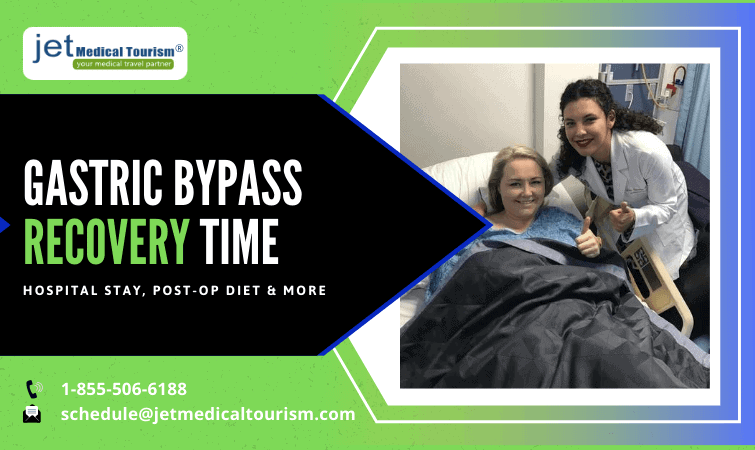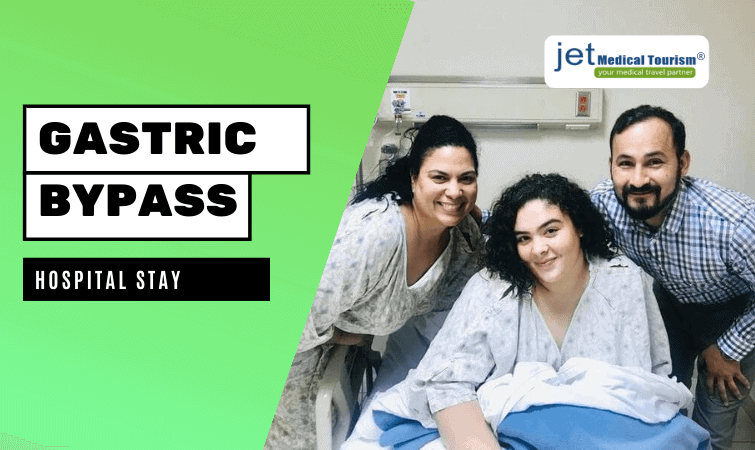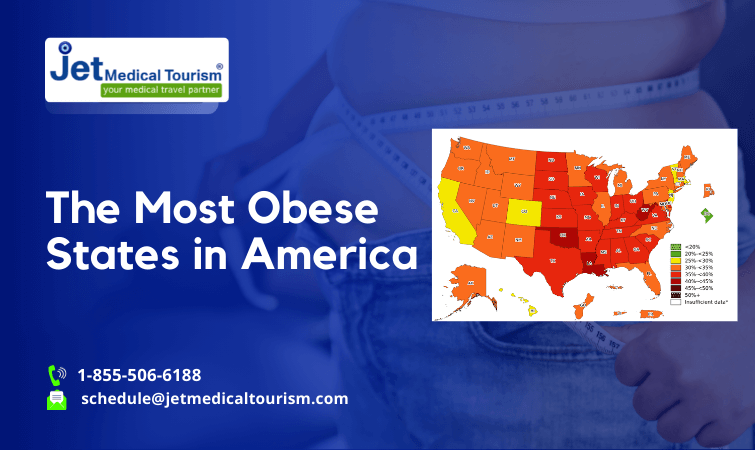Gastric Bypass Recovery Time
Gastric bypass recovery is vital to the success of your weight loss surgery procedure. Make sure that you stay focused on the post-operative care guidelines that your bariatric surgeon will provide for a safe and rapid recovery. Your surgeon will list certain things you can’t do after gastric bypass surgery for a few weeks. They will also advise you about your detailed gastric bypass post op diet and the foods you can’t eat after gastric bypass surgery.
By the time your incisions are fully healed, and you have completely recovered from the surgery, you will start noticing progressive improvement in your health and body appearance. You will rapidly shed off the excess pounds of weight and feel more energized and active. You can enjoy sustainable weight loss results provided you follow the prescribed long-term diet after gastric bypass surgery.
Gastric bypass recovery is safe and predictable when you have chosen the right bariatric surgeon. Call Jet Medical Tourism® today to learn more.
Gastric bypass recovery timeline
At the time of your initial consultation, your bariatric surgeon will discuss with you the estimated gastric bypass weight loss timeline as well as recovery timeline. This will give you an opportunity to schedule your surgery during a period when you can set aside adequate time for recovery. If you are a working individual, you can plan for gastric bypass recovery time off work in order to have a stress-free and safe healing.
Week 1 and 2
For the first week, you should stay at your hotel to take plenty of rest and allow the incisions to heal well. During the second week, the swelling and bruising would have significantly subsided and you can return to your home country. Continue to follow the gastric bypass liquid diet during this period.
Week 3 and 4
Most patients are able to resume their full normal activities during this phase. However, you should avoid any strenuous exercises or lifting of heavy objects. Perform only sedentary or low-stress tasks at your workplace as far as possible. Your post op gastric bypass diet at this stage would primarily include pureed foods.
Month 2 and 3
This will be the final phase of your gastric bypass recovery time. Be alert to the common problems after gastric bypass surgery and maintain the follow-up with your surgeon and their team. By the end of three months, you should be fit enough to go to the gym, play outdoor sports, conduct vigorous exercises, and lead a fully active lifestyle.
Gastric bypass surgery hospital stay
Nowadays gastric bypass surgery is usually performed laparoscopically. This is a less invasive and more precise surgical technique, which allows for a faster gastric bypass recovery time. In many cases, the patient may not even require an overnight stay at the hospital. However, depending on your health condition, your surgeon might recommend you for a short hospital stay.
Early Monitoring and Care
Your roux en y gastric bypass diet will begin at the hospital from day one. The doctors and the nursing staff will periodically monitor your vital signs. The attending team, including a physical therapist will help you perform mild leg movements and deep breathing exercises to improve your blood flow. If you feel any discomfort, such as pain, nausea, or muscle spasms, report it immediately to the on-duty nurse.
Dietary and Other Instructions
Before you leave the hospital, the nutritionist or your doctor will provide you a detailed plan for short term and long term diet after gastric bypass surgery. The staff will also inform you about things you can do and can’t do after gastric bypass. The surgeon will also explain you about the expected gastric bypass weight loss timeline so that you can keep a track of your progress.
Gastric bypass recovery time off work
Gastric bypass post op recovery process is a key component of your overall weight loss surgery. As long as you are committed to following your surgeon’s post-surgical care guidelines, you can expect an excellent recovery. If you are working, you should apply for leave with your employer well in advance because you will need gastric bypass recovery time off work for about one to two weeks.
Plan Your Initial Recovery at Home
To make your recovery easier, you can plan ahead of time so that when you return home after the surgery, you can be fully comfortable. You can ask your surgeon to provide you guidelines for both short and long term diet after gastric bypass surgery.
Based on these guidelines, you can store various food ingredients at home in advance. You may also keep some ice packs, pain medications, gauze, towels, sheets, and pillows at home for your comfort. If you have little kids, you may consider hiring a help for a few days if necessary.
Talk to Your Employer about Work
If your work can be managed virtually from home, you should set up the online work arrangements ahead of time. This will minimize your gastric bypass recovery time off work, and you can resume your job quickly. If this is not possible, you should carefully consider your travel plans.
Drive to work only when you are not taking any strong painkiller drugs. At the workplace, for the first few days, you should request for a desk job or any other work that does not require you to bend, lift heavy weights, or perform strenuous work.
Gastric bypass post op diet
Careful and controlled eating after gastric bypass is essential to the success of your surgery. Roux en y gastric bypass diet in the first few days will only include clear liquids. Liquids are vital to keep you hydrated. Your stomach needs time to heal after the surgery, and until the digestive function is fully restored, it is safe for you to stay on a liquid diet.
Pureed Foods
From the third week after your surgery, your gastric bypass post op diet will include pureed foods. These foods are also primarily liquids, but they have a thicker consistency. Faster healing requires you to eat proteins at this stage. So, your diet at this stage will include about 65 to 75 grams of protein each day for two weeks.
Semi-Solid Foods
In your second and third months of gastric bypass recovery time, you will transition to a soft or adaptive diet. You can eat cereals, cooked vegetables, fish, chicken, soft meats, and some fruit. Eat three times a day, chew well and eat slowly, and focus on small portions at a time. Do not forget to take your protein supplements as directed by your nutritionist.
Solid, Regular Diet
Your weight loss surgeon will monitor the progress during your gastric bypass post op recovery. By the fourth month, they may encourage you to switch to a solid, normalized diet. Continue to limit your food intake and eat nutritious meals to achieve your weight loss goals. Do not fall for any fake gastric bypass diet, and stay focused on your surgeon’s recommended dietary guidelines.
RECOMMENDED READ: Gastric bypass diet: pre-op & post-op diet guide
Gastric bypass liquid diet
Your nutritionist will inform you about the foods you can’t eat after gastric bypass surgery for a few weeks or months. These restrictions are more stringent in the two days prior to your surgery and one week afterwards. During these two brief phases, you will have to follow a clear liquid diet. To ensure a safe and healthy gastric bypass recovery timeline, you should be committed to following this diet plan.
Stay Well Hydrated
Vital nutrients will be delivered to your body through clear liquid soups, juices, and shakes. Drink at least eight to 12 glasses of water per day in order to stay sufficiently hydrated. Refrain from drinking sugary, caffeinated, or carbonated drinks at this early stage of your recovery. This will help you avoid acid reflux, dumping syndrome or other gastric bypass complications.
Focus on Proteins
Protein shakes will be an integral part of your gastric bypass liquid diet. Your body will need about 100 grams of proteins each day at this stage. Therefore, choose protein shakes that contain adequate protein content per serving, but are low on sugar. Remember that your long-term diet after gastric bypass surgery will be solid and enriching, so only the initial part involves a liquid diet.
CHECK THIS TOO: Gastric bypass post op diet
Foods you can’t eat after gastric bypass surgery recovery
Gastric bypass recovery time is a gradual process, which will involve multiple stages. Every stage will involve certain do’s and don’ts as well as a specific diet plan until you fully recovery. Your surgeon will advise you about the things you can’t do after gastric bypass surgery for some time. A large part of the restrictions will apply to your diet in order to allow for safe healing of your stomach and intestines after the surgery.
Food Restrictions will Keep You Safe
Some patients mistakenly assume that after their gastric bypass, they are free to eat anything they want. However, there are certain foods you can’t eat after gastric bypass surgery – at least for a while. Some foods contain only calories and no nutrients, while some others are hard to digest in the initial stages. You need to avoid poorly tolerated foods for some time in order to minimize your risk of post op gastric bypass complications.
Types of Foods that You should Avoid
Here are some of the foods you can’t eat after gastric bypass surgery for the sake of your own safety:
- Calorie-rich, nutrient-poor foods (chips, pretzels, sweets)
- Pasta, bread, and rice
- Dry foods, such as dry cereals, granola, and nuts
- Fibrous veggies, such as broccoli, celery, or cabbage
- Meats with gristle or tough meats (pork chops, steak, ham)
- Fatty foods, such as sausage, bacon, butter, whole milk
- Highly spicy or seasoned foods
- Deep fried foods
- Carbonated, caffeinated, or sugary drinks like soda
Long term diet after gastric bypass surgery
In an ideal situation, gastric bypass diet 10 years later should also be well-balanced, nutrient-dense, and low on empty calories. It is important to understand that the goal of weight loss surgery is to facilitate your diet control by reducing your stomach size. If you forcefully continue to eat more or ignore your diet and nutrition guidelines, you will regain weight or may fail to achieve the desired weight loss.
Healthy Dietary Habits for Life
Remember that good health and fitness is a lifelong journey. To achieve sustainable or permanent weight loss, your long term diet after gastric bypass surgery will play a key role. In general, the critical diet metrics that you must focus on throughout is your total protein intake and total calorie intake per day. As long as you are consuming about 1,000 to 1,200 calories a day and 90 to 100 grams of proteins a day in the first two years, you will more stable weight loss.
Choose Nutritious Foods over Fatty Foods
The key to success with your long term diet after gastric bypass surgery lies in picking the right foods and avoiding the wrong ones. Make sure that your roux en y gastric bypass diet includes nutrient-packed foods that are low on fats and carbs and high on vitamins and proteins. Empty calorie foods, such as sugary foods and fried foods must be avoided. Wrong foods will cause malnutrition and obstruct weight loss, while the right foods will promote weight loss.
Suggested Foods for Your Long Term Diet
Your long term diet after gastric bypass surgery should include foods, such as:
- Proteins: Protein shakes, protein bars, lean meats, such as chicken, turkey and lean ground beef, fish and seafood, Greek yogurt, cottage cheese, eggs, and legumes.
- Carbohydrates: Whole grain foods, such as oatmeal, buckwheat, and brown rice as well as fibrous vegetables and fruit.
- Healthy Fats: Salmon, olives, avocados, natural nut oils and butters, and nuts.
- Water: Make sure that you drink about 64oz. of water daily to stay well-hydrated. Instead of gulping down a large volume at once, drink throughout the day in small quantities.
Common problems after gastric bypass surgery
As long as your bariatric surgeon has performed your gastric bypass in a skillful manner, you can expect outstanding results over time. But from your end, you have to diligently follow their advice for a safe and healthy long-term gastric bypass recovery. If you fail to maintain a reasonable level of discipline with regard to your recommended guidelines, complications may occur at any stage.
Two common problems after gastric bypass surgery include:
- Malnutrition: If you are not following a balanced gastric bypass post op diet, you may develop deficiency of essential vitamins, minerals, or other nutrients. The best way to avoid these issues after your gastric bypass is to regularly take your nutrition supplements in consultation with your dietitian. The supplements may include calcium, iron, vitamin B12, and vitamin B1.
- Dumping Syndrome: Some patients may ignore their ‘gastric bypass liquid diet’ or other dietary guidelines. If you and eat large amounts of solid food in the early recovery phase, it will get dumped into the small intestine directly. This can cause indigestion, bloating, nausea, and abdominal cramps. These common problems after gastric bypass surgery can be corrected by changing your diet.
RELATED POST: Gastric bypass pros and cons
Need more details on gastric bypass recovery time? Contact Jet Medical Tourism®
A successful gastric bypass surgery alone will not meet your weight loss goals. You need a dedicated provider who will guide and support you through your complete gastric bypass recovery. At Jet Medical Tourism®, we are committed to staying the course with you for a healthy and safe weight loss journey.
To learn more about what is gastric bypass surgery, benefits, and the recovery process, we invite you to have a free consultation with one of our gastric bypass surgeons in Mexico. If you are looking for a safe and healthy weight loss surgery, Jet Medical Tourism® is the reliable partner you need. Call us today to schedule a free consultation.
Other useful resources on gastric bypass surgery
- How gastric bypass impacts hunger hormones
- How to restart weight loss after gastric bypass
- Things you can’t do after gastric bypass
- Gastric bypass surgery alternatives: Gastric bypass revision
- Gastric bypass requirements: Am I a good candidate for it?
- How much does gastric bypass cost?
- Gastric bypass before and after pictures
- Gastric bypass cures diabetes: Fact or myth?
- Gastric sleeve vs gastric bypass







